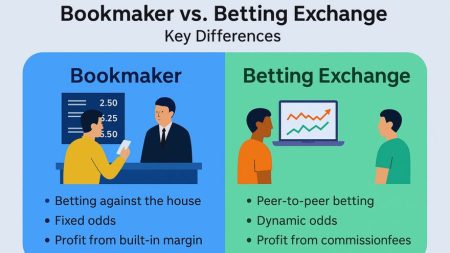Betting has evolved significantly over the past two decades, and one of the biggest innovations is the introduction of betting exchange sites. Unlike traditional bookmakers, betting exchanges allow users to bet against each other rather than the house. While this model offers several advantages, it also comes with certain drawbacks. In this article, we’ll explore the pros and cons of betting exchange sites to help you decide if they’re the right choice for your betting strategy.
What Are Betting Exchange Sites?
Betting exchange platforms like Betfair and Smarkets allow users to both back and lay bets. In simple terms, backing a bet means betting that something will happen, while laying a bet means betting that it won’t. The site takes a small commission on winning bets but does not set the odds itself—those are determined by the users.
Pros of Betting Exchange Sites
1. Better Odds
One of the biggest advantages is the potential for better odds. Since the market is driven by user demand and not by a bookmaker’s margin, you often get more favorable prices.
2. Lay Betting Opportunities
Traditional bookmakers only allow you to back a bet, but on an exchange, you can lay a bet, giving you more flexibility and betting strategies to explore.
3. No Bookmaker Bias
Bookmakers may limit or ban accounts that win too often. On betting exchange sites, you’re betting against other users, so you don’t face the same restrictions.
4. Transparency
You can see the full market, including how much money is matched at certain odds. This level of transparency is rarely available with traditional bookies.
Cons of Betting Exchange Sites
1. Commission Fees
While you may get better odds, most exchanges charge a commission on your winnings, usually around 2–5%. This can eat into your profits over time.
2. Liquidity Issues
Some niche markets may have low liquidity, meaning there aren’t enough users to match your bets. This can be especially frustrating for live or in-play betting.
3. Learning Curve
New users may find betting exchanges complicated. Understanding terms like ‘lay’, ‘back’, and how to manage liability requires some learning.
4. Limited Promotions
Traditional bookmakers often offer free bets, bonuses, and loyalty programs. These are less common on betting exchanges, where promotional offers are rare.
Should You Use a Betting Exchange Site?
Whether or not you should use a betting exchange depends on your level of experience and what you value most in a betting platform. If you prefer better odds, advanced strategies, and transparency, exchanges are worth considering. However, if you’re a casual bettor who enjoys promotions and simplicity, a traditional bookmaker may be a better fit.
Conclusion
Understanding the pros and cons of betting exchange sites is crucial before diving in. They offer flexibility, better odds, and more control—but also require more knowledge and may have limited liquidity in less popular markets. If you’re willing to invest time in learning how they work, betting exchanges can be a powerful tool in your betting arsenal.











